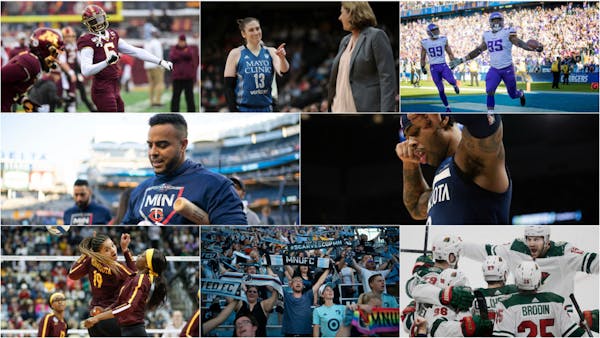Thirty years ago, as his stardom reached dramatic heights, Michael Jordan uttered a line that has stuck with him as a symbol of his reticence toward taking political stands.
"Republicans buy sneakers, too," Jordan said in 1990, in the midst of a politically contentious North Carolina Senate race.
The implication wasn't hard to parse: By choosing sides on an issue, Jordan risked jeopardizing the support, financial or otherwise, of those who disagreed with his stance.
It was striking then to see Jordan break from his own history Sunday to offer thoughts on last week's death of George Floyd in the custody of Minneapolis police and the ensuing protests demanding justice around the world.
"I am deeply saddened, truly pained and plain angry," Jordan said in a statement. "I stand with those who are calling out the ingrained racism and violence toward people of color in our country. We have had enough."
Jordan's comments were measured to be sure, but they are part of an overall sports response that seems to be changing in diversity and tone — as well, perhaps, as phosoph.
While speaking out a generation ago might have been deemed harmful to a brand, staying silent as a sports figure or team during a time of national crisis in 2020 can create an impression of being complacent at best and complicit at worst.
“We need to stand with the black community and fundamentally change how the leadership in this country has dealt with racism. I'm sorry it has taken this long, but I'm hopeful that we can change this NOW.”
That's not to say, though, that what's being said in the wake of Floyd's death is merely an attempt to placate fans — even if some statements from teams and leagues read that way.
More than a moment
The breadth and passion of comments — and in many cases, actions — from athletes of all colors suggest more of a movement than a mere moment across sports.
Among the many voices that registered as both authentic and perhaps unexpected included that of the NHL's Blake Wheeler — a Twin Cities native who posted an impassioned message that examined his own white privilege.
"We need to stand with the black community and fundamentally change how the leadership in this country has dealt with racism," the Winnipeg Jets forward wrote Saturday on Twitter. "I'm sorry it has taken this long, but I'm hopeful that we can change this NOW."
NASCAR driver Ty Dillon posted a similar message on Instagram, while retired baseball star Dale Murphy posed a series of tweets about his son being shot in the eye with a rubber bullet by police during a protest in Denver.
"If you're a beneficiary of systemic racism, then you will not be able to dismantle it at no cost to yourself," Murphy wrote. "You will have to put yourself at risk. It might not always result in being physically attacked, but it will require you to make yourself vulnerable."
Countless leagues and teams have offered statements, but the NBA's Washington Wizards late Sunday released what it called a unified statement from players that didn't mince words. "We will no longer tolerate the assassination of people of color in this country," it read in part, while also promising to take a stand against government leaders and law enforcement.
The Wizards statement ended: "We will no longer shut up and dribble," citing the phrase Fox News host Laura Ingraham used in a critique of LeBron James in 2018.
United they stand
Indeed, it seems more players are speaking out — with James looming large among them. He has been active on both Instagram and Twitter, where combined he has more than 110 million followers, in condemning violence and elevating images of peaceful protests.
Perhaps even more notably, several athletes not only have been active on social media but they have been in the thick of protests and activism themselves.
Former NBA player Stephen Jackson was in Minneapolis last week at a rally for social justice also attended by Timberwolves star Karl-Anthony Towns. Celtics players Enes Kanter and Jaylen Brown made long drives — one to Boston, one to Atlanta — to participate in protests.
"We stand with our players, employees, partners, and fans in being committed to championing the change we need," the Celtics said in a statement Sunday.
Activism in sports is nothing new, of course. But our expectation of it — and the comfort level of sports figures in engaging in it — is perhaps shifting.
Even recently, as part of the 10-part "The Last Dance" documentary, Jordan was asked about his role.
"I do commend Muhammad Ali for standing up for what he believed in. But I never thought of myself as an activist. I thought of myself as a basketball player," Jordan said. "I wasn't a politician when I was playing my sport. I was focused on my craft. Was that selfish? Probably. But that was my energy. That's where my energy was."
And now?
"Our unified voice needs to put pressure on our leaders to change our laws, or else we need to use our vote to create systemic change," Jordan said Sunday. "Every one of us needs to be part of the solution, and we must work together to ensure justice for all."
